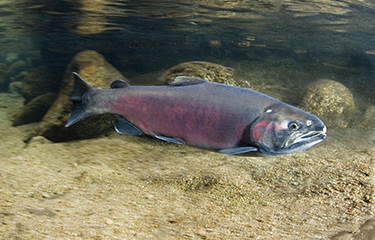Two fishing industry groups plan to sue a baker’s dozen of U.S. tire manufacturers over a chemical found in rubber tires, which the groups claim have had “devastating impacts” on salmon and steelhead.
The chemical, 6PPD, is used to prevent tires from degrading too quickly. However, it breaks down into 6PPD-quinone when exposed to ground-level ozone. The new chemical can kill coho salmon within hours of exposure and can lead to urban runoff mortality syndrome, according to environmental nonprofit Earthjustice, which is representing the Institute for Fisheries Resources (IFR) and the Pacific Coast Federation of Fishermen’s Associations (PCFFA) in the lawsuit.
“This chemical kills the coho salmon that we need to restore damaged coho runs that were once abundant,” IFR/PCFFA Executive Director Glen Spain said in a statement. “Coho salmon, which can no longer be harvested given their extremely low numbers, are already on the brink of extinction and 6PPD use in tires has now been revealed as a major driver of these losses.”
In response, IFR and PCFFA plan to sue the nation’s largest tire manufacturers under the Endangered Species Act.
“By continuing to use 6PPD in tires, companies are killing critically imperiled salmon and other fish protected under the Endangered Species Act,” Earthjustice’s Biodiversity Defense Program Senior Attorney Elizabeth Forsyth said. “These tire companies have known for years that 6PPD is devastating to aquatic species, but they have thus far failed to remove this dangerous chemical from tires.”
The companies being sued are the American businesses of Bridegestone, Continental Tire, Giti Tire, Goodyear, Cooper Tire and Rubber Company, Hankook Tire, Nokian Tyres, Kumho Tire, Michelin, Pirelli Tire, Sumitomo Rubber, Tokyo Tire, and Yokohama Tire. The companies were sent a 60-day notice on 15 August.
Simultaneously, Earthjustice has submitted a petition to the Environmental Protection Agency (EPA) on behalf of the Yurok, Port Gamble S’Klallam, and Puyallup Tribes to ban the use of 6PPD in and for tires.
“To see 6PPD-q kill the salmon that are reared in the Port Gamble S’Klallam Tribe’s own streams and from its own hatchery is an unconscionable slap in the face to a people who rely on salmon for their wellbeing, in addition to being a gross violation of the Tribe’s rights as enshrined in the 1855 Treaty of Point No Point,” Port Gamble S’Klallam Tribe environmental scientist Josh Carter said. “If EPA truly cares about protecting the environment and the Tribe’s Treaty Rights, not just industry’s pocketbooks, it will act now.”
Photo courtesy of NOAA Fisheries







